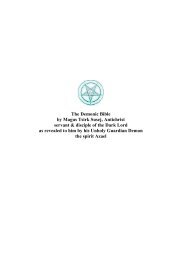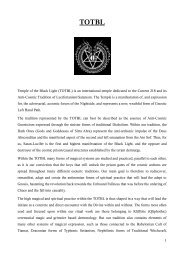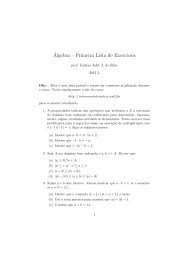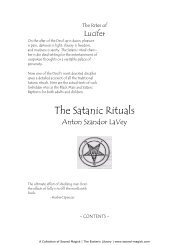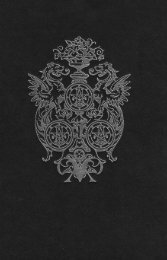Satanism Today - An Encyclopedia of Religion, Folklore and Popular ...
Satanism Today - An Encyclopedia of Religion, Folklore and Popular ...
Satanism Today - An Encyclopedia of Religion, Folklore and Popular ...
You also want an ePaper? Increase the reach of your titles
YUMPU automatically turns print PDFs into web optimized ePapers that Google loves.
136 Judaism <strong>and</strong> Hebrew Scriptures<br />
biblical accounts. The problem with accepting<br />
these accounts at face value, however, is that both<br />
the original authors as well as later editors likely<br />
had a theological inclination to diminish the independent<br />
power <strong>of</strong> demonic spirits. What this<br />
means is that ordinary Hebrews probably understood<br />
demons as more independent <strong>of</strong> God<br />
than scriptural accounts might seem to indicate.<br />
Nevertheless, it is clear that the demonic becomes<br />
stronger <strong>and</strong> more evil across time until, following<br />
the incorporation <strong>of</strong> Zoroastrian notions, demons<br />
become purely negative entities who seem to have<br />
no other purpose than to torment human beings.<br />
Embodying a pattern that Christians would<br />
later adopt, there are a number <strong>of</strong> passages in the<br />
early books <strong>of</strong> the Bible in which gods other than<br />
Yahweh are referred to as “demons” (Hebrew<br />
Shedim). Thus in Deuteronomy, it is noted that,<br />
“They sacrificed to demons which were no gods”<br />
(32:17). Later, in the Psalms, it is also noted that<br />
“They sacrificed their sons <strong>and</strong> daughters to<br />
demons” (106:37). Although the former are<br />
ambiguously alluded to as “strange gods,” the<br />
latter are identified as interchangeable with the<br />
“idols <strong>of</strong> Canaan.”<br />
Scholars generally accept that there are at least<br />
two demons explicitly referred to in Hebrew scriptures,<br />
Lilith <strong>and</strong> Azazel. The Lilith <strong>of</strong> Jewish<br />
folklore appears to have originally been a<br />
Mesopotamian night demon with a penchant for<br />
destroying children. She later picked up the role <strong>of</strong><br />
succubus, a female demon who copulates with<br />
living men in their dreams. In the Talmud, she<br />
becomes the first wife <strong>of</strong> Adam who refuses to<br />
accept her subservient role. Adam then ejected<br />
her, <strong>and</strong> God created Eve as a more obedient helpmate.<br />
Although not mentioned by name in the<br />
Bible, the night hag mentioned in Isaiah 34:14 was<br />
retrospectively viewed as referring to Lilith.<br />
Azazel is mentioned by name in the Book <strong>of</strong><br />
Leviticus, where he appears to have been some<br />
sort <strong>of</strong> a desert creature to whom the ancient<br />
Israelites dedicated their scapegoats containing<br />
the sins <strong>of</strong> the nation: “Aaron shall cast lots upon<br />
the two goats, one lot for the Lord <strong>and</strong> the other<br />
lot for Azazel. <strong>An</strong>d Aaron shall present the goat on<br />
which the lot fell for the Lord, <strong>and</strong> <strong>of</strong>fer it as a sin<br />
<strong>of</strong>fering; but the goat on which the lot fell for<br />
Azazel shall be presented alive before the Lord to<br />
make atonement over it, that it may be sent away<br />
into the wilderness to Azazel” (Leviticus 16:8–10).<br />
Much later, Azazel was the name <strong>of</strong> one <strong>of</strong> the<br />
chieftains <strong>of</strong> the 200 fallen angels who, according<br />
to the Book <strong>of</strong> Enoch (mentioned in Genesis<br />
6:2–4), came to earth to mate with mortal women.<br />
Azazel, it is said, taught men how to fashion<br />
weapons, <strong>and</strong> women such things as cosmetics<br />
(encouraging vanity).<br />
Demons are also mentioned later in the<br />
Talmud <strong>and</strong> Midrash, though they are not viewed<br />
as independent powers in revolt against God. By<br />
the Middle Ages, they were sometimes portrayed<br />
more as mischiefmakers, though this image alternated<br />
with a much more sinister one. The Book <strong>of</strong><br />
the Pious (Sefer Hasidm), one <strong>of</strong> the most influential<br />
texts <strong>of</strong> the medieval period, mentions<br />
demons frequently, <strong>and</strong> there are many discussions<br />
<strong>of</strong> exorcism in its pages. Demons also appear<br />
in the Zohar <strong>and</strong> in other cabalistic literature.<br />
The Jewish Satan was never as sinister as his<br />
Christian counterpart. Initially, in fact, satan was<br />
not a being at all, but was, rather, an accusatory or<br />
adversarial role assigned by God. Specifically, the<br />
earliest satans were angels, sent by God for the<br />
purpose <strong>of</strong> obstructing or blocking the acts <strong>of</strong><br />
human beings. Thus, for example, in the story <strong>of</strong><br />
Balaam’s Ass in Numbers, one <strong>of</strong> the earliest books<br />
<strong>of</strong> the Bible, God sends an angel to block Balaam’s<br />
route, “But God’s anger was kindled because he<br />
went; <strong>and</strong> the angel <strong>of</strong> the Lord took his st<strong>and</strong> in<br />
the way as his adversary” (Numbers 22:22).<br />
The word being translated here as “adversary”<br />
is the Hebrew word satan. This original concept<br />
subsequently goes through a gradual expansion <strong>of</strong><br />
meaning. By the time <strong>of</strong> the Book <strong>of</strong> Job, a much<br />
later composition, Satan has become the name <strong>of</strong><br />
a specific angel in God’s celestial court: “Now<br />
there was a day when the sons <strong>of</strong> God came to<br />
present themselves before the Lord, <strong>and</strong> Satan<br />
also came among them. The Lord said to Satan,<br />
‘Whence have you come’ Satan answered the<br />
Lord, ‘From going to <strong>and</strong> fro on the earth, <strong>and</strong><br />
from walking up <strong>and</strong> down on it’” (Job 1:6–7).<br />
Here Satan is described as a “son <strong>of</strong> God,” apparently<br />
reporting in to his heavenly king. In Job,<br />
Satan’s role appears to be that <strong>of</strong> a prosecuting




